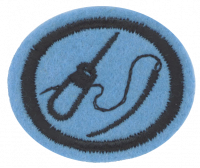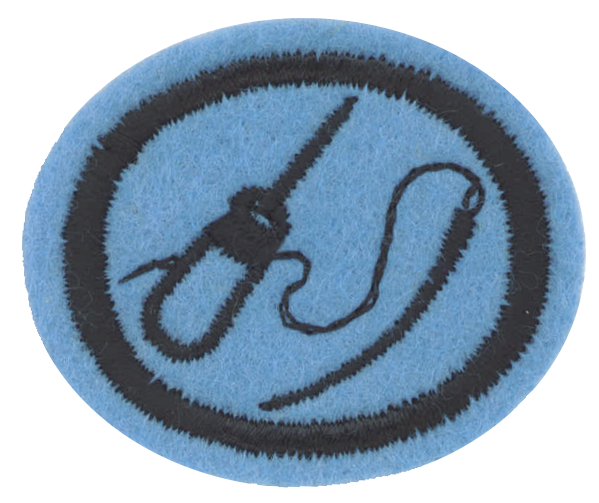Especialidades JA/Trabajos en cuero/Respuestas
Nivel de destreza
1
Año
1937
Version
19.02.2026
Autoridad de aprobación
Asociación General
1
Once the design is ready, the leather should be moistened. Moistening softens the leather and makes it more amenable to having an impression made on it by the stamp. The leather is then placed flat on the work surface in front of the crafter. Then the stamp is placed on a section of the leather where the design calls for an impression to be made. The crafter carefully holds the stamp in a vertical position with the stamp face held against the leather. Then the top of the stamp is struck sharply with the mallet.
Once this is done, the stamp is moved to an adjacent area, and the mallet is brought to bear once again. This is repeated until all the areas that are to be impressed have been impressed. The crafter may switch to any number of different stamps as called for in the design.
Once the design has been stamped into the leather, the leather may be cut to shape (though cutting can also be done before stamping).
The piece is then ready for a finish. (See requirement 5).
2
- Calfskin
- Calfskin is a soft leather with dense grain. The hair follicles are tightly packed in a random pattern.
- Goatskin
- Goatskin is softer and generally more stretchy than calfskin, but it too has a dense grain. The hair follicles are arranged in rows. Tanned leather from goatskin is considered extremely durable and is commonly used to make rugs (for example in Indonesia) and carpet binding. It is often used for gloves, boots, and other products that require a soft hide. Kid gloves, popular in Victorian times, are still made today.
- Imitation leather
- Imitation leather can be distinguished from genuine leather by its appearance, odor, and feel. The flesh side of genuine leather is fuzzy, whereas the "flesh" side of imitation leather is either smooth, or even cloth-backed.
Do not be fooled by the term "top grain leather." Top grain leather is not, as its name implies, the top layer of the animal's hide. Leather, in its natural form is quite thick, so it is split into layers. The outermost layer is called "full grain." Top grain leather is the next layer beneath.
The only type of leather suitable for tooling is vegetable tanned, full grain leather. This is because the vegetable tanning process allows the leather to absorb water, which is used to soften the leather before the carving process, and the grain of the leather is necessary to allow the leather to hold the shape after the carving process is complete. Other leathers lack these two essential qualities.
3
4
5
6
References
- Leathercraft & Weaving (REA's Hobbies & Crafts Series)
- Kingsmere Crafts an excellent web site with a wealth of information about leather craft.


